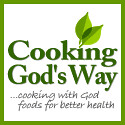
I have just finished up reading a great new book, Real Food for Mother and Baby by Nina Planck. This book explains the benefits of feeding our children a traditonal, whole-foods diet from the time of conception and on through adulthood. Unfortunately, many children today exist on poor diets full of processed, sugar-laden and nutrient-void foods. By the age of 1, many children have already eaten a Happy Meal and are even able to identify the "golden arches" as the symbol of McDonald's!
So, what does the author suggest that children eat? Instead of that Happy Meal, how about a meal of scrambled egg with sea salt and avacado drizzled with olive oil? Your children like to snack on crackers? Replace them with good-quality cheese and fruit! The point is to replace all the over-processed, refined foods with fresh, high-quality ingredients that are as close to their natural state as possible, for example a piece of fresh fruit instead of sugar-laden fruit juices, or butter instead of man-made margarine.
The author refutes several mainstream practices for feeding babies and children, including introducing meats/proteins as on of the first foods for baby, not pureeing foods for baby (let them try small bites of what you are eating), seasoning baby's food with salt and allowing so-called "no no" foods such as fish, shellfish, citrus and honey before baby's first birthday.
She encourages moms to feed their babies lots of high-quality fats, meats, fruits and vegetables, cheeses and cultured dairy, organ meats (especially iron-rich liver!), even fish roe! She also reccomends raw milk rather than pasturized.
The book also has sections on eating a whole-foods diet to increase fertillity, eating well during pregnancy and the importance of mom's diet while breastfeeding.
This is pretty much how I am feeding Henry, and how I will feed the new baby as well. (Unfortunately, I wasn't so informed about the benefits of whole-foods nutrition when Brett was a baby!) I allow Henry to feed himself small pieces of meat, cheese, fruit, bread, etc... If he is eating something very messy or that requires utensils to eat, then I help him: for example, soup or mashed potatoes. I like that when he is self-feeding, he simply stops when he is full. A baby will often eat way more than they want or need when being spoon-fed, just opening their mouth automatically to accept the spoon! I have no reservations about feeding him a high-fat diet, because his developing brain and body need the fat, and I also know the fat he is consuming is high-quality (extra virgin olive oil, coconut oil, butter, etc..) We don't use refined sugars, but instead sweeten with maple syrup, honey or rapadura. We try to avoid artificial flavorings and colorings.
I will definitely be following the author's suggestions for the breastfeeding mom with my new baby! As a first-time nursing mom, I want to make sure that my little one recieves optimum nutrition from the start.
I highly reccomend this book for any mom, be it her first baby or her fifth!


















What a great book! My youngest is 7, but I'll keep it in mind for grandkids someday. I think the baby food companies are making a killing on expensive foods that no one grew up on prior to the last 40 years or so. I didn't know a lot of this either when my girls were young, but we did feed them whatever we ate once they were eating more solid foods. I never made "kiddie" meals that were different. Today, they eat just about anything and we can take them to wonderful restaurants when we travel or go on special outings. (Not to mention they eat the healthy stuff and like it.
ReplyDeleteAnd Welcome to River Rock Cottage, Alexis. Glad to have you following along!
This sounds very similar to Nourishing Traditions cookbook/resource book that changed my life. Preach it, Sister!
ReplyDeleteDear Amy Loves and Cheesemakin' Mamma -
ReplyDeleteYour blogs are cool. I'd be delighted to send you a copy of my new book, Real Food for Mother and Baby, if you'd like to write me with your mailing address at my facebook page.
Yours truly,
Nina
www.RealBabyFood.info